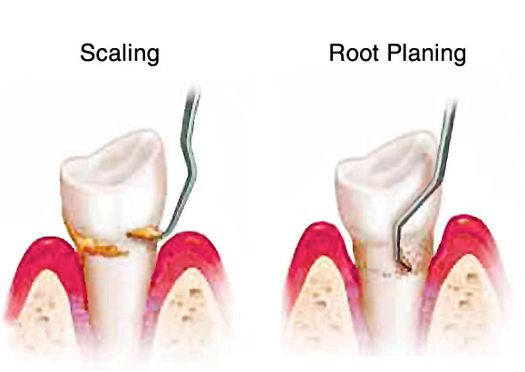Scaling and Root Planing

Periodontitis is a serious gum disease that should not be left untreated. If a dentist is not seen to treat the gums, the individual may begin to lose teeth. Although periodontal disease is serious, there are several types of valuable treatments available.
Surgery is a common form of action, but depending on the severity of the condition, a non-surgical procedure called scaling and root planing may be appropriate.
Process overview
Root exfoliation and planning is actually a thorough tooth cleaning procedure that is ideal in the early stages of periodontitis. During this time, the individual’s teeth may sag or develop abnormal spaces between the teeth. As these pockets enlarge, the teeth will separate from the gums and eventually fall out.
Excess bacteria on teeth can also be accidentally swallowed and make a person sick. This situation is very serious for people with heart-related conditions because bacteria can get into the bloodstream and cause inflammation in the chambers of the heart.
Scaling and root planing are generally administered as a single treatment under local anesthesia unless there is significant tooth damage. During the “scaling” portion of the procedure, the dentist uses mechanical aids to remove excess bacteria from the teeth. The bacteria can be in the form of plaque, tartar, or cavities.
The “brushing” part of the procedure involves cleaning below the gum level. Because bacteria may not be visible, the dentist looks for rough surfaces and uses a handpiece to remove dirt or bacteria. There are two common types of hand instruments: an ultrasonic instrument or a scraper. Dental patients tend to prefer the ultrasound instrument because it causes less discomfort.
Suitable candidates
To determine whether a person’s periodontal disease is appropriate for scaling and root planing, dentists use a guide from the American Dental Association (ADA). According to the ADA, gum disease that extends 3-6 millimeters below the gum line is suitable for scraping and root planning. Gum disease deeper than this amount will likely require surgery.
After the procedure
Because with scaling and root planning the dentist works on sensitive areas of the teeth and gums, people may experience some soreness, soreness, and slight bleeding after the procedure. The individual may also notice a temporary sensitivity to hot or cold drinks.
In most cases, over-the-counter medications are sufficient to relieve symptoms. The dentist should be contacted if it persists for an extended period of time.
For those suffering from stubborn gum disease, dentists recommend tartar removal. Tartar removal is a dental procedure used to remove tartar and plaque from the teeth and restore healthy gums. This escalation procedure is usually intertwined with another procedure known as root planing.
The hygienist or dentist numbs the roots of the teeth and gums with a local anesthetic, as when performing the tartar removal process, and the tooth flaking combined with root planing causes only minor discomfort. Plaque build-up below and above the gumline in hardened deposits are removed with special tools. The rough spots on the roots associated with the teeth are smoothed out by smoothing the roots, which could otherwise lead to gum disease, such as when bacteria are trapped and retained by these rough spots.
Although the procedure is completed in one visit, one half or one quadrant involving the mouth is recommended per visit. The gums tend to become numb from the effect of anesthesia after peeling and planning as it softens a bit. The gums regain a healthy, firm, and pink appearance when starting the routine of brushing twice a day and flossing daily.
It is essential for the dental hygienist or dentist to know the individual’s overall health history before performing the scaling and root planning process. Bacteria can enter the bloodstream through this procedure because precautions must be taken to treat gum disease in people at increased risk of infection, such as those with liver disease, heart problems, or a gum disease compromised immune system caused by disease in the form of HIV.
--------------------------------
Guestbeat.com Notice!
Audience discretion is needed, Read TOS.
Submit Guest Post / Read Latest / Category List
App & Rate-Us / Subscribe Daily Newsletter (FREE)
-
Dental Express San Diego specializes in dentist services such as dental exam and dental implants in San Diego, CA and nearby areas.



